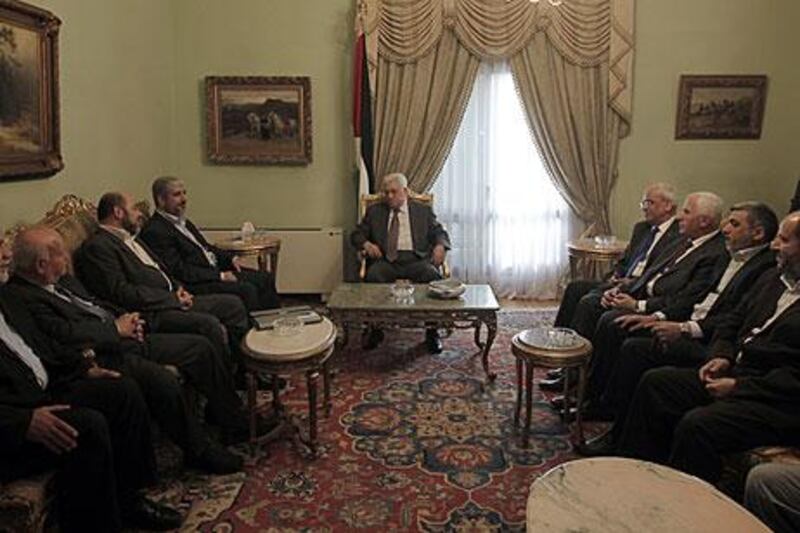CAIRO // The Palestinian Authority leader Mahmoud Abbas and the Hamas chief Khaled Meshaal yesterday hailed a new era of partnership between their rival movements at talks in Cairo aimed at cementing a unity deal.
The two leaders said they had managed to iron out their differences and turn over a new page in their relationship.
“We want to assure our people and the Arab and Islamic world that we have turned a major new and real page in partnership on everything do to with the Palestinian nation,” Mr Meshaal said.
Mr Abbas, who heads Fatah, added: “There are no more differences between us now. We have agreed to work as partners with joint responsibility.”
It was the first time the two had met for talks since they signed a reconciliation deal in early May. That deal had largely been put on the back burner while they dealt with other issues.
Azzam Al Ahmed, a Fatah official, said the talks focused on terms of the unity agreement and on how it should be implemented.
“All the movements who signed the reconciliation agreement in May will be invited to put the final touches on it and start applying it on the ground, and to move forward towards ending the division, and elections,” he said.
They also discussed the question of a truce with Israel, and the question of popular resistance, he said.
Key issues on the agenda were a unified Palestinian strategy, hammering out an interim government, reforming the Palestine Liberation Organisation (PLO) and agreeing on a date for elections.
After a summer of scepticism over prospects for a real rapprochement between Mr Abbas’s secular Fatah movement and its Islamist rival, Hamas, a new optimism has emerged in recent weeks.
“President Abbas intends to deploy all possible efforts to reach a global Palestinian agreement and reach an understanding on a common political vision for all the movements,” Mr Ahmed said in comments echoed by Hamas officials.
“We want this meeting to open a new page and a new hope for the Palestinian people,” the Hamas deputy head, Mussa Abu Marzuk, said when he arrived in Cairo.
Hamas, which controls Gaza, and Fatah, which rules the West Bank, have long been political rivals.
But tensions led to deadly violence in 2007 when Hamas forces routed their Fatah rivals and seized control of Gaza.
They signed a surprise agreement in May that called for the immediate formation of an interim government to pave the way for presidential and parliamentary elections within a year. It has yet to be implemented with the two sides bickering over the composition of the caretaker government and, in particular, who would head it.
The deal has been criticised by Israel. Benjamin Netanyahu, the Israeli prime minister, said yesterday he hoped Mr Abbas would stop the reconciliation process with Hamas, which is seen as a terrorist organisation by Israel and the United States.
The accord has also been received with caution in the US and by the European Union, prompting Hamas official Izzat Al Rishq to accuse both of seeking to perpetuate Palestinian political divisions.
Washington and Brussels have said they will not work with a government that included Hamas unless the Islamists recognised Israel, renounced violence and agreed to abide by previous Israeli-Palestinian agreements.
“Unfortunately the Americans and Europeans have taken negative positions on the meeting between the brothers Meshaal and Abbas,” Mr Rishq said.
“This position is the result of their desire for the continuation of the Palestinian division so they can continue to impose their dictates on the Palestinian people.”
On Wednesday, the EU’s acting representative to the Palestinian territories said he had low expectations that the meeting would break the deadlock in implementing the unity deal.
“I wouldn’t expect much progress right now,” John Gatt-Rutter told reporters in Jerusalem, pointing out Hamas and Fatah were very far apart on forming a government, agreeing a date for elections and reforming the PLO.





